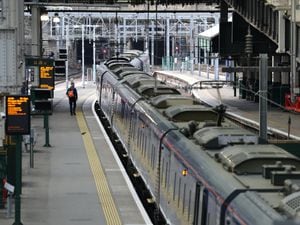Warning over shortage of skilled railway workers
Around 15,000 workers could be due to retire from the rail industry by 2025, research estimated.

The UK rail industry faces a critical shortage of skilled workers, putting the success of major new projects at risk, a new report is warning.
Up to 120,000 extra workers will be needed over the next five to 10 years, with demand for skills peaking around 2025, according to research by City & Guilds and the National Skills Academy for Rail (NSAR).
The organisations said their study painted a “stark picture” for the future, amid an ageing workforce, and only 16% of employees being female.
Serious systemic issues have created a shortage of trained and talented employees, just when the industry needs them most, said the report.
The research indicated that 15,000 workers could be due to retire from the rail industry by 2025.
Brexit is set to exacerbate the problem, potentially reducing access to overseas workers, said the report.
Between 7,000 and 12,000 additional workers will be needed every year over the next five to 10 years, it was estimated.
Martin Hottass of City & Guilds Group, said: “The UK rail industry is on the cusp of leading a once-in-a-generation infrastructure revolution, with the potential to create thousands of high quality jobs across the country at a time when they are needed most.
“However, the dual blow of Brexit and a retirement cliff edge, in addition to systemic issues around growing and retaining skills, means unless Government, employers and industries work together to urgently addresses these issues, they risk scuppering this golden opportunity.”
Neil Robertson, chief executive of the NSAR said: “The rail industry’s lack of diversity and perception by younger people, are well known.
“By hiring people from different backgrounds and regions and providing them with quality skills and career progression, we can ensure that these infrastructure projects not only create jobs, but also promote positive socioeconomic change.”
The report called for measures to “transform” the rail industry to attract interest from young people especially.
Mick Cash, general secretary of the Rail, Maritime and Transport union, commented: “This report shows we are now seeing the consequences of a policy which in recent decades has seen railway engineering such as track and signal construction and train building and train maintenance being fragmented and outsourced to a patchwork of competing interests who operate in their short-term interests rather than the long terms needs of the industry.
“To allow skills to be created, retained and also seamlessly transferred around the railway we need a return to a unified and integrated approach to railway itself and the stable, secure and attractive career path that would create.”
Manuel Cortes, general secretary of the Transport Salaried Staffs Association, said: “I urge the Government and industry leaders to take on board the report’s recommendations and act now to prevent a skills gap opening across our rail industry.
“Clean, accessible travel on public transport must be a core part of our future infrastructure and way of life and investing in railway staff is crucial to its success.
“As this report rightly identifies, there is a clear need to attract new people to our industry due to skills shortages and that means it is imperative that our rail industry becomes more inclusive.”





